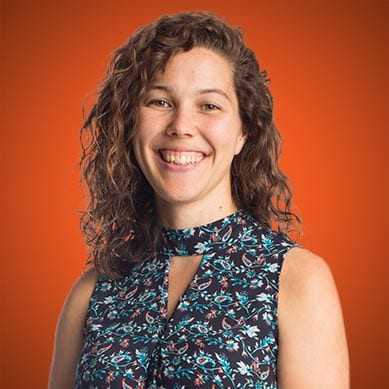Hannah Cory is a PhD candidate in nutrition at the Harvard TH Chan School of Public Health. She is part of the Health Policy Research Scholars Cohort 2017.
Before we begin, tell us a little bit about yourself and what your research interests are.
I’m a first-generation doctoral student that grew up in Northern California in a county that’s as naturally beautiful as it is isolated. I was raised primarily by my mother, in a home that valued good food, dancing, and social justice. I’m a bit of an oddball in my family because I pursued the sciences, but I believe how I was raised really informs the work I do today. I’m broadly interested in understanding how youth develop healthy relationships to their bodies and food, and how socialization/social context supports and impedes that process and its impacts on chronic disease risk.
What’s the story behind why you’re doing what you’re doing?
Before pursuing a PhD, I worked as a dietician in a school-based health center. I saw that a lot of well-meaning nutrition education caused my patients anxiety and made them feel they didn’t know how to take care of themselves because many recommendations were prescribing a wealthy (and white) lifestyle to them. I once had a patient tell me, “Miss Hannah, it feels like everyone in here wants me to be white and I’m never going to be white.” As a mixed-race, but usually white-coded, clinician, that really struck me because it made me remember those pressures about my body from my childhood too.
When I tried to look into tools that were tailored to my community’s needs, I saw that they mostly didn’t exist. This process clarified for me that a lot of nutrition is built on colonial notions of there being a “correct” way to eat, which more often than not exclude many non-Western-European cultural identities. I chose to pursue a PhD to do research with my community in the hope of finding ways to develop affirming tools that help youth of all identities love their body, enjoy food, and feel capable of taking care of themselves. My work is aimed at understanding structural barriers and ways to transform the systems that bar people from that piece of their mental and physical health.
Tell us about a project you are currently working on that you are excited about.
I’m currently developing a community-based participatory research project in collaboration with one of the schools I used to work in. We’re hoping to use Photovoice to capture what youth identify as supports and barriers to having a healthy relationship with their bodies through photography. The project is still in early stages, but we’re planning to get it underway this coming year.
For people unfamiliar with your research area, what is one piece of information you think is important for them to know?
Body diversity is natural and assigning what bodies are “good” versus “bad” has roots in anti-blackness and white supremacist notions of who is valuable. If we want to create an equitable world where all people are allowed to thrive, a crucial piece of that is that we have to make it safe to be fat. Our current culture of health, especially in the United States, will have to be transformed to make that a reality.
Who is a researcher you admire and why?
A researcher I admire is Ida B. Wells. I know she isn’t considered a traditional “researcher,” but that’s who comes to mind when I think of who inspired me to do research. When I read about her work documenting lynchings in the U.S. as a high school student, it was the first time I remember realizing that counting things mattered. She realized that not having data allows people to claim a problem doesn’t exist, and she dedicated her life to changing that. I especially admire her work because she knew that data alone was just the first step. I think she embodies a researcher that recognized the importance of connecting her research to advocacy and policy actions, and bridging those worlds.
How has being an HPRS Scholar helped you during your time as a doctoral candidate?
HPRS has been an essential part of my doctoral process. Not only did I receive policy training that has helped me to consider policy implications, even from the early stages of my work, but I’ve also gained an incredible network of fellow scholars that inspire me on a daily basis. Having the opportunity to get to know and collaborate with scholars from so many different fields and backgrounds has pushed me to expand my thinking and helped me to feel confident in my choice to ground my work in community and health equity.
In the HPRS program, we have worked with you to help you think further about using your research to develop policy. If you could use your research to change any policy, what policy would it be?
I am hopeful that my quantitative and qualitative work can be used in the future to help dismantle programs that focus on Body Mass Index (BMI) as an indicator of health. In many states, students receive BMI report cards from their schools, which I believe is a harmful practice – not only to youth and their families’ mental health, but also their long-term chronic disease risk.
OK, here’s a fun question to wrap things up. If you had a talk show, who would your first three guests be?
I know it would be a very niche show, but I was obsessed with SNL as a kid and would absolutely take the opportunity to interview some of my childhood heroes. Ideally, my first three guests would be: Maya Rudolph (I wanted to be her when I grew up), Molly Shannon, and Amy Poehler.
Thank you so much for your time!

